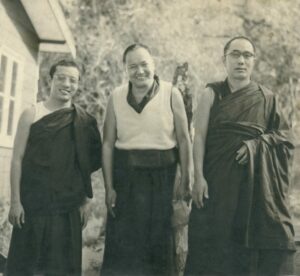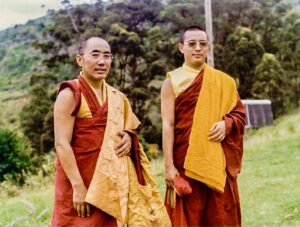Excerpts from the Biography of Geshe Acharya Thubten Loden in Prayers for the Path of Indivisible Great Bliss and Emptiness Compiled and translated by Geshe Acharya Thubten Loden. Pages 244-246.
In 1976 Lama Thubten Yeshe, the spiritual head of a new Buddhist meditation centre in Australia, requested Geshe-la to accept a teaching position there. By careful reflection Geshe Loden determined that this would be of benefit and sought the advice of his Gurus, His Holiness the Dalai Lama and His Holiness Trijang Rinpoche. His Holiness the Dalai Lama confirmed his finding, advising him to accept the post, stay in Australia for three years and then return to his disciples in India. As the interview ended His Holiness clasped his hand and explained that he would need great perseverance to teach continuously for three years and great patience to deal with some difficult students, telling him not to be disheartened, bored or become ill during the task.
On arrival at the Chenrezig Institute for Wisdom Culture, near Eudlo in Queensland, Australia, Geshe Loden assumed his position as resident Dharma teacher and began a three year programme of instruction assisted by Venerable Zasep Tulku Rinpoche, a young reincarnated lama who had learned English during his studies in India and Thailand.

The essential purpose of the schedule was to establish in the students a firm foundation of the three principle paths (renunciation, bodhichitta and the wisdom cognising emptiness) through the practice of teachings on the Graded Path to Enlightenment and the Mind Training techniques….. He also introduced preliminary teachings on the practise of tantra… [and] gave many empowerments for the practice of Action tantric deities such as Tara, Manjushri, Avalokiteshvara and Medicine Buddha.
In December 1979 Geshe Thubten Loden returned to India and resumed his work at Sera Monastic University and Gyumay Tantric College, to the great joy of his many disciples. First though, he paid his respects to his Gurus in Dharamsala – His Holiness the Dalai Lama and the two Tutors. At these interviews the possibility of another visit to Australia was discussed.
The impact of Geshe-la’s Dharma teachings, spiritual advice and personal example during his three year visit to Australia had left groups of devoted students throughout the country. These followers had begun to establish new centres of the Dharma and requested that Geshe-la be the spiritual leader of these centres. They requested him to return to Australia as soon as possible to teach and guide the growing number of people developing an interest in the vast and profound teachings of Tibetan Buddhism.
On the advice of his teachers, Geshe-la agreed to return to Australia, making it his home and dedicating himself to the development of the Dharma in the West. He named his centres the Tibetan Buddhist Society. By the time he arrived in Australia for the second time, three Tibtean Buddhist Society centre had been established, in Sydney, Brisbane and Melbourne, to be followed a short time later by one in Perth.

Geshe-la began teaching Dharma again immediately upon his arrival. Travelling from centre to centre he taught Nagarjuna’s Precious Garland of Advice to a King and on another occasion Nagarjuna’s Letter to a Friend. He told students on many occasions that these texts contained wonderful advice on how to integrate the practice of Dharma into daily life activities. As well as these teachings, Geshe-la ensured that all his centres established and maintained regular Path to Enlightenment teaching programmes as the backbone of the teaching schedule.
For the first two years Geshe-la taught through a translator, this time a young Tibetan, Norbu Samphel, with a degree in Buddhist studies from the Varanasi Sanskrit University in India. However, Geshe-la had long since decided that he would master the English language so that he could communicate the Dharma directly to his students.
During the early 1980s Geshe-la put a great deal of effort into English study and despite his age and, learned quickly so that by 1983 he was able to begin teaching without the aid of a translator.
